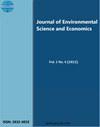尼日利亚腐败与经济增长关系的自回归分布滞后方法
引用次数: 7
摘要
尼日利亚的腐败引起了全球及其公民的关注。这种担忧是因为腐败继续破坏该国的社会经济发展。因此,本研究利用1980年至2018年的年度数据,实证调查了腐败对尼日利亚经济增长的影响。本研究采用自回归分布滞后(ARDL)模型作为估计技术。在本研究中,经济增长用国内生产总值增长率(GDPGR)来代表,腐败用腐败感知指数来代表。结果显示,从长远来看,腐败对尼日利亚的经济增长具有负面和显著的影响。这一发现表明,在本研究期间,腐败阻碍了尼日利亚的经济发展进程。因此,建议尼日利亚的反腐败机构,如经济和金融犯罪委员会(EFCC),应通过颁布法律加强这些机构调查、逮捕和起诉罪犯的权力。本文章由计算机程序翻译,如有差异,请以英文原文为准。
Autoregressive Distributed Lag Approach (ARDL) to Corruption and Economic Growth Nexus in Nigeria
The corruption in Nigeria is generating concern around the globe and among its citizens. This concern is because corruption has continued undermining the country's socio-economic development. Thus, this study empirically investigates the impact of corruption on economic growth in the Nigerian economy using annual data from 1980 to 2018. The study employed the autoregressive distributed lag (ARDL) model as its estimation technique. In this study, economic growth was proxied by gross domestic product growth rate (GDPGR), while corruption was proxied by the corruption perception index. The result revealed that corruption has a negative and significant impact on economic growth in Nigeria in the long run. This finding implies that corruption has impeded the economic development process in Nigeria within the period of this study. Thus, it was recommended that anti-corruption agencies in Nigeria, such as the Economic and Financial Crime Commission (EFCC) should be strengthened by enacting laws that will empower them to investigate, arrest and prosecute offenders.
求助全文
通过发布文献求助,成功后即可免费获取论文全文。
去求助
来源期刊

Journal of Environmental Science and Economics
Environmental Economics-
自引率
0.00%
发文量
0
期刊介绍:
Journal of environmental science and economics (JESCAE), ISSN: 2832-6032 is an open access peer-reviewed journal that considers articles and reviews articles on all aspects of environmental economics.
Aim and Scope
Journal of Environmental Science and Economics is an international scholarly refereed research journal that aims to promote the theory and practice of environmental economics, Sustainability research, technological innovation, and economics. A broad outline of the journal''s scope includes; peer-reviewed original research articles, case, and technical reports, reviews and analyses papers, short communications and notes to the editor, in interdisciplinary information on the practice and status of research in environmental science, sustainability, technological innovations, and economics.
The main aspects of research areas include, but are not limited to; Environmental pollution control and abatement technology, Sustainable and economic Development, sustainable consumption and Sustainability, Environmental and sustainability assessment, transport and fate of pollutants in the environment, concentrations and dispersion of wastes in air, water, and non-point sources pollution, atmospheric pollutants and trace gases, environmental impact assessment, industrial ecology, ecological and human risk assessment; improved energy management and auditing efficiency and environmental standards and criteria.
 求助内容:
求助内容: 应助结果提醒方式:
应助结果提醒方式:


